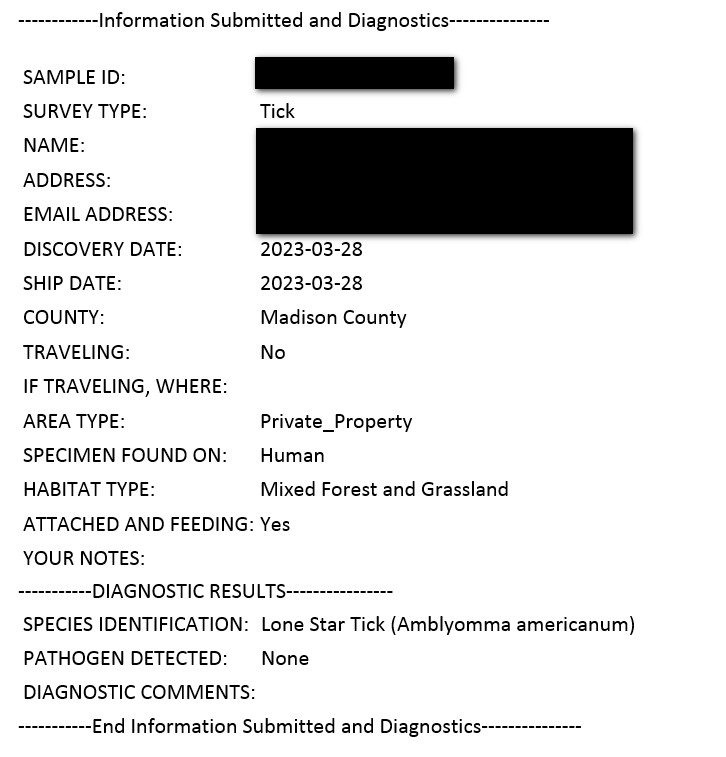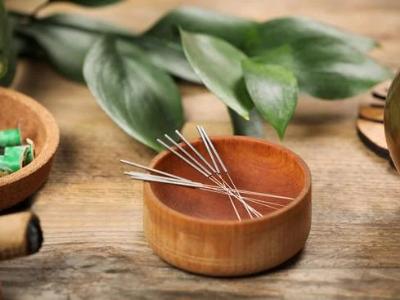As a person who was raised to look at every creature as having a place and purpose in the world—I admit there is a short list of critters I just can’t find a reason to have around. At the top of my list is the tick. Some of the most stubborn diseases we treat come from a bite from these tiny bloodsuckers. Worse yet, the range of conditions keeps growing; both in terms of geographical regions and the types of pathogens they carry.
Early diagnosis and removal of the tick are essential in preventing the development of severe complications. Additionally, preventive measures such as wearing protective clothing, using insect repellents (we are currently working on developing one!), and conducting regular tick checks after outdoor activities can help minimize the risk of tick bites and subsequent diseases.
One of our local universities is doing a study analyzing ticks that are being sent in from around the region to map what they are carrying and where they are found. I highly encourage you to support the University of Kentucky in this initiative and as a bonus, they will send you a report of their findings (here is a sample):

For me, it was peace of mind to know that the ticks I found attached to me were not carrying anything harmful.
University of Kentucky Entomology Page
University of Kentucky Guide to Identification and Testing and form link
So what was I worried about? In our area, Lyme and Rocky Mountain Spotted Fever are common, and along with those, Babesiosis and Ehrlichiosis are possible infections. Even before I had the results—I took steps to protect myself. I don’t often recommend antibiotics unless absolutely necessary but for people who tolerate doxycycline well it’s definitely worth a call to your doctor to discuss doing a prophylactic round of antibiotics after a tick bite. Not all of us have that option though—I have a genetic anomaly that puts many medications on the “avoid if possible list”, including most antibiotics, so I have developed other strategies for care. I took 2 weeks of strong anti-microbial herbs that have an excellent track record against most tickborne diseases and also boost immune activity as a precaution. As an additional concern, since one of the ticks was a Lone Star Tick, there was a chance of developing an allergic reaction to mammals (see our Alpha Gal article for more information about this unusual allergy). Fortunately, I didn’t develop that either but if I had—yes, acupuncture can help with that too!
If you made it this far into the article, congratulations! As a thank you for being loyal reader, use the code “tickssuck” for 10% off you next order from our website. Discount code valid 6/15/23 - 7/15/23. Not valid with other offers, not valid for gift cards. Other restrictions may apply.
Now, back to the tickborne diseases—part of the challenge with diagnosing tickborne infections is the testing can be very inaccurate with a high rate of false negatives. Most of these pathogens excel at hiding in tissues rather than circulating in the bloodstream allowing them to be hidden in the body and evading detection through traditional methods. Further complicating the issue is for people who have a history of concussion or whiplash injuries, these pathogens can more easily bypass the blood brain barrier and infiltrate the brain creating a host of neurological symptoms. In fact, some studies found that people who have had a concussion or whiplash are 80% more likely to develop chronic issues from tickborne diseases than those who don’t. The link between post-concussive issues and chronic tickborne diseases has only recently been published in the medical literature, but I see it frequently in the clinic. I suspect the 80% is a conservative number based on what I see in the office—so far 100% of my chronic tickborne disease patients have a history of concussion or whiplash.

Acupuncture is a useful adjunct in these cases, but acupuncture alone will not resolve these cases. It takes an intensive combination of herbs, nutritional supplements, dedication to eating mostly anti-inflammatory foods, and getting enough rest and meditation to help heal the brain to see a full recovery—but the good news is there is hope. It’s not a fast process, but it is effective for the majority of our patients who follow their care guides. So if you or someone you know is struggling with unexplained fatigue, joint pain, brain fog, persistent muscle knots that don’t respond to body work or acupuncture, weird non-diabetic neuropathy and otherwise feel awful but their bloodwork is all normal—odds are very good that we can help!